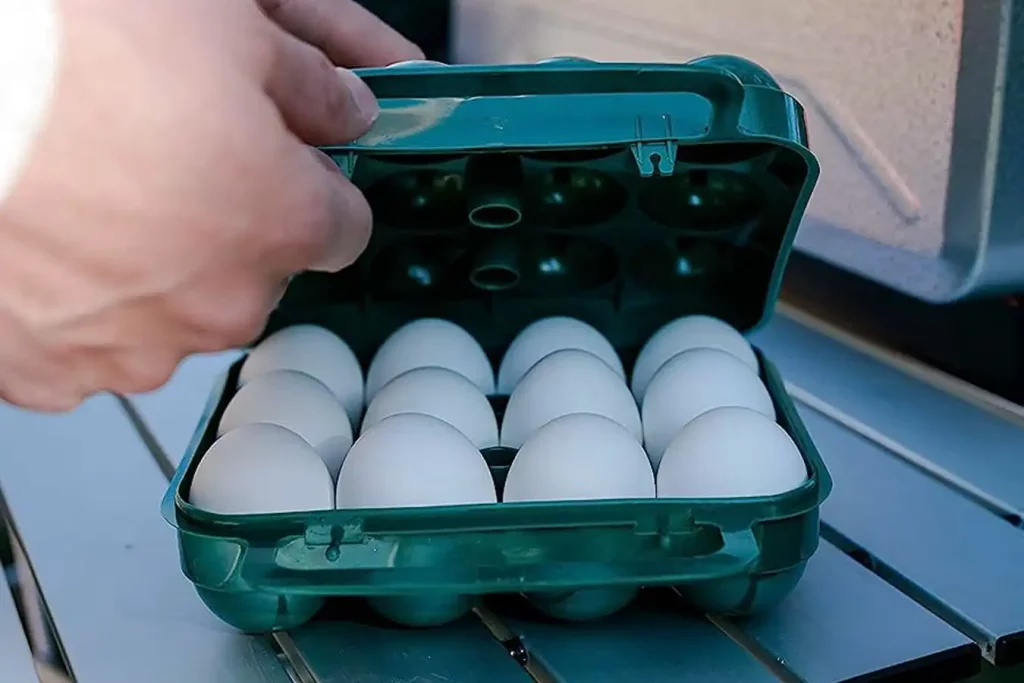Venturing into the great outdoors and puzzling over how to pack eggs for camping? We’re here to hatch your confusion and guide you step by step through the process.
I've been there, staring at a potential breakfast disaster while miles from the nearest store.
Eggs can be fickle travel buddies, but with the right approach, they're the best breakfast companion for a morning by the campfire.
Turns out, the wilderness has its own set of rules, even for packing breakfast.
So, gather around, fellow campers.
I'm about to share some wilderness wisdom that'll make your next camping trip egg-ceptional!
Why Bring Eggs on a Camping Trip?
Before we get into the how-to, let's take a look at why eggs are such a great camping food.
Nutritional Value of Eggs
First and foremost, eggs are packed with protein. A single egg contains about 6 grams of protein, which is essential for repairing tissues and building muscles after a long day of hiking. Eggs are also rich in vitamins and minerals, including vitamin D, vitamin B12, and iodine.

Versatility in Cooking Options
Perhaps one of the most appealing aspects of bringing eggs to a camping trip is their versatility. They can be scrambled, fried, boiled, or even baked into a campfire bread. Plus, they're the perfect addition to a hearty breakfast or a simple dinner.
Convenience of Egg-based Meals
Lastly, cooking with eggs is quick and easy, which is exactly what you need when you're in the great outdoors. All you need is a pan and a heat source, and you're good to go. Plus, they're relatively mess-free, especially if you pack them properly.
Read more: How to Use a Dutch Oven While Camping
Understanding Egg Freshness and Safety
Before we delve into how to pack eggs for camping, it's important to understand the basics of egg freshness and safety.
Freshness Indicators for Eggs
A fresh egg will have a thick, cloudy white, a high, round yolk, and no smell. Older eggs will start to have a thin, clear white and the yolk may be flat or even broken. If you're not sure whether an egg is fresh, you can do the float test. Fill a bowl with water and place the egg inside. If it sinks, it's fresh. If it floats, it's older and you should not take it camping.

How to Store Eggs at Home Before Camping
To keep your eggs fresh before your camping trip, it's best to store them in their original carton in the refrigerator. This helps to protect them from absorbing odors from other foods. It's also a good idea to take eggs from the back of the shelf in the store, as these are often fresher.
Food Safety Precautions for Eggs
When camping, it's crucial to maintain food safety. Make sure to store eggs in a cool box if the weather is hot, and never eat an egg that's cracked or smells off. Remember that food-borne illnesses can be more serious when you're out in the wilderness without easy access to medical care, so it's better to be safe than sorry.
Also learn: What Food Should I Bring for 3 Days Camping
Choosing the Right Eggs for Camping
Picking the right type of eggs for your camping adventure can make a world of difference. Here, we'll compare farm-fresh eggs to store-bought, delve into the world of powdered eggs, and discuss the pros and cons of liquid eggs.

Comparison: Farm-Fresh Eggs vs. Store-Bought Eggs
Farm-fresh eggs and store-bought eggs can differ significantly when it comes to freshness and safety. Farm-fresh eggs are often unwashed, which means the protective coating, or “bloom,” is intact, potentially allowing them to stay fresh longer without refrigeration. However, they also have a higher risk of containing bacteria like Salmonella, especially if the hens aren't vaccinated.
Store-bought eggs, on the other hand, are typically washed, removing the protective bloom. This makes refrigeration essential. They're generally safer due to regulatory standards, but won't last as long outside the fridge.
Benefits of Using Powdered Eggs
For those seeking a lightweight, no-fuss option, powdered eggs are a great choice. These dehydrated eggs are easy to carry and have a long shelf-life. Plus, they don't require any special storage conditions. Just add water when you're ready to cook. The trade-off, however, is in the taste and texture which might not appeal to everyone.
Considerations for Using Liquid Eggs
Liquid eggs, sold in cartons, are another alternative. They're basically pre-beaten eggs that are ready to cook. The upside is convenience – no shells, no mess. The downside is that they need to be kept cold, which can be a challenge when camping.
Different Ways to Carry Eggs
When it comes to carrying eggs for camping, you have a few different options. Let's break them down one by one.
Carrying Whole Eggs
Whole eggs can be a delicate cargo, but with the right packing methods, they can make it to your campsite unscathed.
Egg Carriers
Egg carriers are specifically designed to hold each egg securely in place, protecting them from cracks and breaks. You can find plastic egg carriers (on Amazon) or foam egg carriers in most outdoor stores or online. They come in different sizes, usually accommodating up to a dozen eggs.

DIY Methods (Cardboard, Plastic Containers)
If you're in a pinch and don't have an egg carrier, you can get creative with DIY methods. For instance, you can use an empty egg carton and reinforce it with extra cardboard for strength. Alternatively, a plastic container with dividers (On Amazon), like a clean berry box, can work too. Remember to add padding like bubble wrap or paper towels to minimize jostling.

Pre Scrambled Eggs
Pre scrambling your eggs can save you time and eliminate the worry of carrying fragile whole eggs.
How to Pre Scramble Eggs
Pre scrambling eggs can be a real time-saver. Simply crack the eggs into a bowl at home, beat them, and then pour them into a leak-proof container. You can even add salt, pepper, and other spices, so they're ready to cook.

Storage Options (Zip-Lock Bags, Squeeze Bottles)
A great way to carry pre-scrambled eggs is in a sturdy zip-lock bag. You can also use a squeeze bottle, which makes it even easier to pour the eggs onto your pan when it's time to cook.

Dehydrated Eggs
Dehydrated eggs are a lightweight, non-perishable option for longer trips or for those wanting to carry less weight.
Benefits of Dehydrated Eggs
Dehydrated or powdered eggs are light, portable, and require no refrigeration. They have a long shelf-life and are very easy to cook with, making them a fantastic option for longer trips or for those who prefer to pack light. Plus, they're just as delicious and versatile as fresh eggs once rehydrated.

Rehydrating Process
To use dehydrated eggs, you'll need to rehydrate them. When you're ready to use dehydrated eggs, all you have to do is mix them with water. The usual ratio is one tablespoon of egg powder to two tablespoons of water for the equivalent of one egg. Once mixed, they can be used just like regular eggs. The result is a nutritious, protein-packed meal that's just as satisfying as its fresh counterparts.
Each of these methods has its own benefits and drawbacks, so consider your needs and preferences when making a choice.
There we go! We've covered the ‘why' and the ‘what' – up next, we'll get to the nitty-gritty of ‘how' to pack eggs for camping. Stay tuned for a step-by-step guide and some clever tips and tricks to make it as easy as possible.
Detailed Steps on How to Pack Eggs for Camping
Let's break down the process of packing eggs for camping, step-by-step. From choosing the right eggs to ensuring they're packed safely and effectively, this guide will provide you with all the tips and tricks you need.
Choosing the Right Eggs
Before you pack, you need to decide which type of eggs to bring. If you're camping for a short duration, freshly layed organic eggs or store-bought eggs could work, but remember that farm-fresh eggs last longer without refrigeration due to the intact protective bloom. For longer trips, consider powdered or liquid eggs, as they are lightweight and don't require special storage conditions.

Packing Whole Eggs
Using Egg Carriers
Egg carriers can be purchased from camping supply stores and come in various shapes and sizes. These are designed to hold each egg separately, reducing the risk of cracks and spills. Simply place each egg in the allocated slot, close the carrier securely, and you're good to go. Remember to pack the carrier in a spot where it won't get squashed.

DIY Methods
If you're up for a little DIY action, start with a sturdy, sealable plastic container (Amazon). Line the bottom with a cushioning material like bubble wrap, a soft towel, or even shredded newspaper. Place your eggs inside, and add more cushioning material on top. Ensure the eggs can't move around, then seal the container. Voila, you've got a homemade egg carrier!
Packing Pre-Scrambled Eggs
Pre-Scrambling Process
At home, break your eggs into a bowl and beat them until the yolks and whites are fully combined. For added convenience, you can even add salt, pepper, and other seasonings right now, saving you time at the campsite.
Storing in Containers
Pour your pre-scrambled eggs into a leak-proof container. Clear, reusable plastic bottles are a great choice because you can easily see how much you have left, and they pack well in a cooler. Just remember, pre-scrambled eggs must be kept cold, so be sure to store them in a cooler with plenty of ice or ice packs.
Packing Dehydrated Eggs
Process of Dehydration
Packing dehydrated eggs involves buying them (making them at home can be a complex process requiring special equipment). Dehydrated eggs are available in most grocery stores or online, and typically come in a pouch or can.
Storing Dehydrated Eggs
The beauty of dehydrated eggs is their convenience. The original packaging is designed for easy transportation, so you don't need to repack them. Keep them sealed until you're ready to use them, as exposure to moisture can cause them to spoil. Once opened, make sure to seal them tightly and store in a cool, dry place.
In short, to pack eggs for camping, carefully place them in a hard-shell plastic container with individual compartments, like a camping egg carrier or portable egg case, to prevent cracking or breaking during transit.
By following these detailed steps, you can ensure your eggs arrive at your campsite just as fresh and intact as when they left home.
To Stay Warm Camping in 30 Degree Weather check out this article.
Safety Tips for Carrying Eggs While Camping
Let's talk about safety, which is of utmost importance when dealing with food items during camping. From the right storage temperature to ensuring your eggs are consumed before they spoil, these safety tips will ensure you have a worry-free camping trip.
Storage Temperature and Conditions
Whether you're carrying whole, pre-scrambled, or dehydrated eggs, proper storage is critical. Whole and pre-scrambled eggs need to be kept in a cooler at a temperature below 40°F to prevent the growth of bacteria. As for dehydrated eggs, they should be stored in a cool, dry place away from sunlight.
Using Eggs Before Spoilage
Remember the rule of thumb: when in doubt, throw it out. If your whole or pre-scrambled eggs have been left out of the cooler for more than two hours, it's best to discard them. For dehydrated eggs, once the package is opened, they should be consumed within the period suggested on the package to ensure freshness.
Creative Camping Egg Recipes
Now that you know how to safely pack and store eggs, let's explore some delicious and easy-to-make egg recipes perfect for your camping trip.
Recipes for Whole Eggs
Campfire eggs-in-a-hole is a classic. Simply cut a hole in a piece of bread, place it in a preheated skillet over your camping stove or fire, crack an egg into the hole, and cook until the egg is done to your liking.
Recipes for Pre-Scrambled Eggs
How about a hearty breakfast burrito? Pour your pre-scrambled eggs into a heated skillet and cook until done. Add some cheese, sauteed bell peppers, and onions. Wrap it all up in a tortilla for a filling and delicious start to your camping day.
Recipes for Dehydrated Eggs
Dehydrated eggs can be rehydrated and used in any recipe that calls for eggs. For a quick and easy camping meal, rehydrate your eggs and mix them with dehydrated hash browns, some water, and your choice of seasonings. Cook over a campfire for a satisfying and fuss-free meal.
Read more: How to Pack a Backpack with Clothes
FAQs about Packing Eggs for Camping
Can You Crack Eggs Ahead of Time for Camping?
How Do You Pack Eggs for Travel?
How Do You Pack Eggs for Hiking?
How Do You Pack Eggs So They Don't Break?
Can I Crack Eggs and Leave Them in the Fridge?
How Long Do Cracked Eggs Last Camping?
Final Words for Pack Eggs for Camping
Packing eggs for camping might seem like a daunting task, but with the right information and tools, it can be simple and stress-free. By choosing the right type of eggs, packing them carefully, and following the necessary safety precautions, you can enjoy delicious and nutritious egg meals on your camping trip.
Remember to consider the length and conditions of your trip, as well as the storage options available to you. Most importantly, keep safety in mind to ensure your eggs remain fresh and safe to eat. So, next time you plan a camping trip, don't forget to pack some eggs. You won't regret it!
So why wait? Embark on your next camping adventure armed with these egg-pert tips and tricks, and elevate your camping meals to a whole new level!
Read next: How to Pack a Backpack for Hiking


